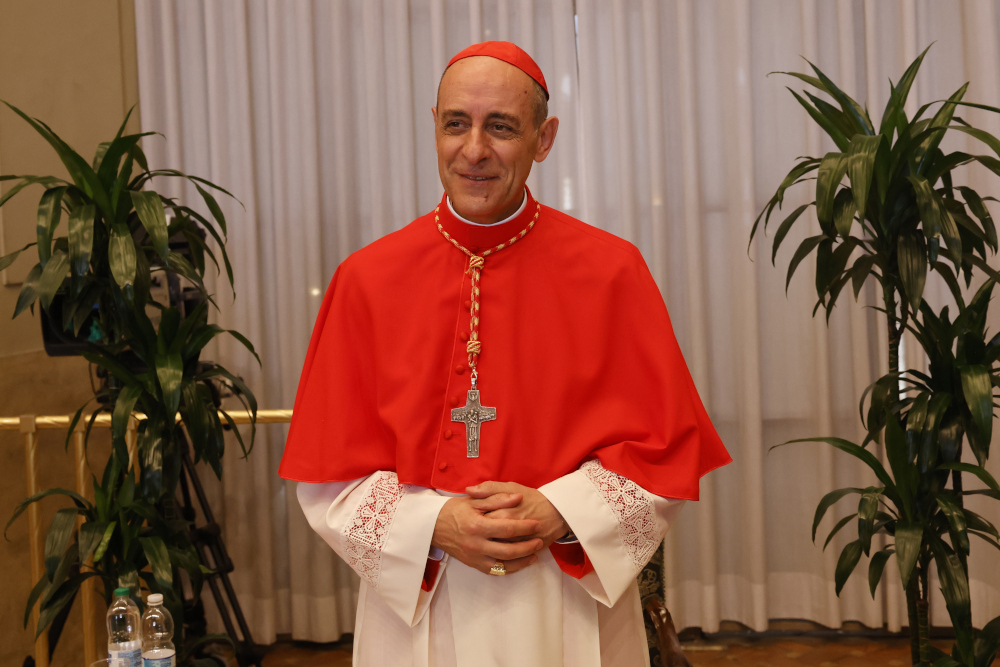
New Cardinal Víctor Manuel Fernández, Prefect of the Dicastery for the Doctrine of the Faith, poses for a photo at the end of the consistory where Pope Francis elevated 21 new cardinals in St. Peter's Square at The Vatican, Saturday, Sept. 30, 2023. (AP Photo/Riccardo De Luca)
Clergy sexual abuse survivors on Oct. 2 unveiled a proposed new church law calling for the permanent removal of abusive priests and superiors who covered for them, as they stepped up their outrage over Pope Francis' choice to head the Vatican office that investigates sex crimes.
The global advocacy group End Clergy Abuse unveiled the draft law at a press conference following days of protests around the Vatican, and before taking their complaints to the U.N. in Geneva. They are seeking to draw attention to the ongoing scandal in the Catholic Church and the failure of Francis and the hierarchy to make good on years of pledges of "zero tolerance" for abuse.
Specifically, the survivors have expressed astonishment at Francis' nomination of an old friend and theologian, Cardinal Victor Fernández, to take over as prefect of the Dicastery for the Doctrine of the Faith, given Fernández's record handling cases as bishop in his native Argentina.
When Fernández was bishop of La Plata, Argentina, he refused to promptly remove one of his priests, Eduardo Lorenzo, who was repeatedly accused of abusing teens. Ten years after a victim first came forward, and hours after learning that an Argentine judge had ordered his arrest, Lorenzo was found dead in 2019 in what was ruled a suicide. Fernández had stood by Lorenzo and officiated at his funeral.
The Vatican office that Fernández now heads has processed priest abuse cases globally since 2001, meting out church punishments that are never more severe than being defrocked, or "reduced" back to being a layman. After bullish years under the late Pope Benedict XVI, who defrocked nearly 850 priests in a decade, the office in recent years appears to have taken a more lenient approach as cases poured in from around the globe.
Francis himself had a big learning curve on abuse, arriving at the Vatican in 2013 claiming to have never handled a case and then botching a big scandal in Chile in 2018. He did an about-face, vowed "zero tolerance" for abuse and marshalled through a new church law holding bishops accountable when they cover up cases.
But recently, the momentum appears to have waned, transparency has remained elusive and victims have sensed a backsliding — perhaps none more so than in Francis' nomination of Fernández to head the Vatican's sex abuse office.
"We easily went back 10 years on this issue this week," said Peter Isely, a founding member of both End Clergy Abuse (ECA) now and its U.S. partner organization, SNAP.
One of Lorenzo's victims, Diego Perez, was in Rome this week and said he couldn't believe Fernández was now in charge of the office that processes abuse cases globally.
Advertisement
"Surely he shouldn't be in this position," Perez told reporters.
Fernández acknowledged in an interview with The Associated Press earlier this year that he made mistakes in the Lorenzo case, saying he should have removed him from ministry earlier and treated his victims better. He blamed his own inexperience and what he said were unclear church procedures.
The online resource BishopAccountability.org has documented two other cases that it said showed Fernández stood by his priests rather than their alleged victims.
Francis made Fernández a cardinal on Sept. 30, after telling him in his letter of appointment that he wouldn't have to handle abuse cases personally in his new Vatican job. Francis said the office's small discipline section, headed by an Irish priest, would handle the dossier, even though the scale of the problem has long cried out for authoritative, high-ranking leadership in a hierarchy still resistant to removing abusers.
The proposed new church law that ECA unveiled on Oct. 2 calls for any priest who commits a sexual offense against a minor or "vulnerable adult" to be dismissed from the clerical state. Any bishop or religious superior who fails to report sex crimes to law enforcement would also be removed.
Janet Aguti, an ECA member from Uganda, said the cover-up of clergy abuse cases in Africa is even worse than elsewhere because of the stigma of sexual crimes and the exalted status that priests have in African communities. That makes it hard for victims to come forward, much less find justice from the state or church authorities, who typically respond by moving abusers to new dioceses, she said.
"They (priests) have helped us to build schools, they have helped us to build hospitals. And you don't want to be the first to come out and point fingers at them because then the community is going to turn against you," she said.
Organizers said they have tried in various ways to get the text of the proposed "zero tolerance" law into Francis' hands, including via a high-profile cardinal helping to run the Vatican's big meeting of bishops this month, Cardinal Jean-Claude Hollerich.
Hollerich told organizers he'd give Francis a copy in December.







